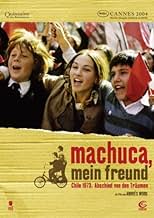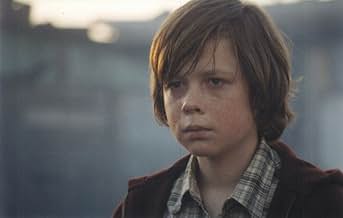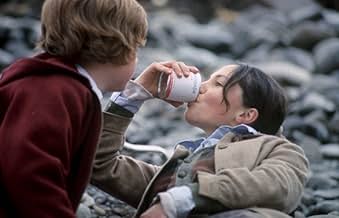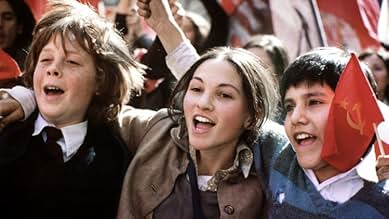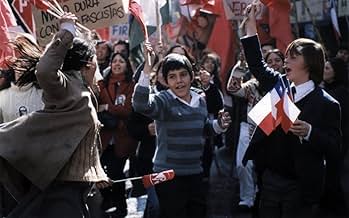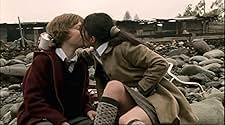Two 12-year-old Chilean children from different social classes become friends in 1973. They both discover each other's world as political tensions in their country increase.Two 12-year-old Chilean children from different social classes become friends in 1973. They both discover each other's world as political tensions in their country increase.Two 12-year-old Chilean children from different social classes become friends in 1973. They both discover each other's world as political tensions in their country increase.
- Awards
- 13 wins & 7 nominations
Aline Küppenheim
- María Luisa Infante
- (as Aline Kuppenheim)
Daniel Alcaíno
- Sargento Ejército
- (as Daniel Alcaino)
Storyline
Did you know
- TriviaAs stated by the director in several interviews, the movie was shot only on Sundays, due to its small budget.
- GoofsSilvana is standing by the outhouse, then moments later, after camera pans, appears on the other side of Gonzalo.
- Quotes
Patricio Infante: Socialism might be better for Chile but not for us.
- Crazy creditsIn the credits at the beginning of the film, the last letter of each word drifts slowly to the right separating from the names
- ConnectionsFeatured in Sin maquillaje: Tamara Acosta (2013)
- SoundtracksAi Amor
Written and performed by Buddy Richard
Featured review
Our film is shot in Santiago, Chile, and follows two schoolboys shortly before the 1973 military coup. Gonzalo Infante is the son of a wealthy, upper middle class family and goes to a good school. His parents are outraged that children from the poor shanty towns are being introduced to the school and encouraged to mix with their children. Among the shanty town dwellers is the young Pedro Machuca. He and Gonzalo form an increasing bond of friendship as they grow into adolescence. But the gulf between their backgrounds is a powerful one.
The film has been hailed as the most successful Chilean film ever. Made on an apparently tiny budget with help from the UK and Spain, it is anything but small budget in appearance (money from the industrialised European countries goes a long way in Chile!) The story is engaging throughout, and for the Westerner the glimpses into the political history are a window onto a different world.
As there are so many myths surrounding both Allende and Pinochet, I've added a short synopsis that might help as background (and with respect to Chilean scholars I am no expert in the field this sort of information can be gleaned from Amnesty International, recently released USA documents and scholarly sources.
Allende was popularly elected to implement an 'anti-imperialist' program of building socialism within a democratic and constitutional framework in November of 1970. Chile at this time was in the depths of an economic crisis and, like many Latin American countries, had had much of its natural wealth and even ability to manage its own affairs taken by foreign investors, legally and illegally. The lifestyle of the wealthy upper classes contrasted to the poverty of people in the shanty towns, but the educated elite held considerable power. Bent on creating economic chaos, opponents of the new government began deliberately to exacerbate these difficult conditions: the political set off a large exodus of capital, a cessation of private investment, and an extensive withdrawal of bank deposits. nationalizations of American and other foreign-owned companies had sharply increased tensions with the United States, which gave the Nixon administration sufficient excuse to orchestrate an international financial blockade, restricting economic credit to Chile. Simultaneously, C.I.A subsidies were flowing to right-wing media, politicians, and organizations, to assist a campaign of domestic destabilization.
Allende committed suicide in the final stages of the CIA-backed military coup led by Pinochet. The United States had ran covert actions in Chile between 1963 and 1973 leading to the ascension of General Pinochet. The US Government's official report of the operations said it epitomized CIA covert actions (worldwide). However brutal the Pinochet government, it was 'good' for US interests. Thus began 17 years of dictatorship which ended March 11, 1990. According to Amnesty International and the United Nations' Human Rights Committee, 250,000 Chileans had been detained for political reasons by the end of 1973. In 1990, having failed in his bid to gain popular ratification for his rule, Pinochet handed over the presidency to the rightfully- elected Patricio Aylwin Azocar. Chile now has a market economy and the political climate has since remained stable, although there is still considerable tension between the military and the government concerning human rights violations of the Pinochet era. Pinochet still retains a considerable group of supporters, both inside and outside the country and the myths and stereotypes he generated still haunt the political future of Latin America. Some still vividly remember the social anarchy (hyperinflation, expropriation, land invasions and violent confrontations) under the socialist policies of Allende. The more important reason, however, is Chile's economic performance. Without the direct and intentional destabilising influence, and with opponents or poor people simply exterminated, the economy improved. In the weeks that followed the coup, thousands of unionists, socialists, students and left-wing activists were raped, tortured, starved and murdered. extermination of thousands of civilians in South America, but the remaining elite were protected and international relations 'normalised'. As Gonzalo's father says in the film: 'Socialism is good for Chile ... it's just not good for us.'
The film has been hailed as the most successful Chilean film ever. Made on an apparently tiny budget with help from the UK and Spain, it is anything but small budget in appearance (money from the industrialised European countries goes a long way in Chile!) The story is engaging throughout, and for the Westerner the glimpses into the political history are a window onto a different world.
As there are so many myths surrounding both Allende and Pinochet, I've added a short synopsis that might help as background (and with respect to Chilean scholars I am no expert in the field this sort of information can be gleaned from Amnesty International, recently released USA documents and scholarly sources.
Allende was popularly elected to implement an 'anti-imperialist' program of building socialism within a democratic and constitutional framework in November of 1970. Chile at this time was in the depths of an economic crisis and, like many Latin American countries, had had much of its natural wealth and even ability to manage its own affairs taken by foreign investors, legally and illegally. The lifestyle of the wealthy upper classes contrasted to the poverty of people in the shanty towns, but the educated elite held considerable power. Bent on creating economic chaos, opponents of the new government began deliberately to exacerbate these difficult conditions: the political set off a large exodus of capital, a cessation of private investment, and an extensive withdrawal of bank deposits. nationalizations of American and other foreign-owned companies had sharply increased tensions with the United States, which gave the Nixon administration sufficient excuse to orchestrate an international financial blockade, restricting economic credit to Chile. Simultaneously, C.I.A subsidies were flowing to right-wing media, politicians, and organizations, to assist a campaign of domestic destabilization.
Allende committed suicide in the final stages of the CIA-backed military coup led by Pinochet. The United States had ran covert actions in Chile between 1963 and 1973 leading to the ascension of General Pinochet. The US Government's official report of the operations said it epitomized CIA covert actions (worldwide). However brutal the Pinochet government, it was 'good' for US interests. Thus began 17 years of dictatorship which ended March 11, 1990. According to Amnesty International and the United Nations' Human Rights Committee, 250,000 Chileans had been detained for political reasons by the end of 1973. In 1990, having failed in his bid to gain popular ratification for his rule, Pinochet handed over the presidency to the rightfully- elected Patricio Aylwin Azocar. Chile now has a market economy and the political climate has since remained stable, although there is still considerable tension between the military and the government concerning human rights violations of the Pinochet era. Pinochet still retains a considerable group of supporters, both inside and outside the country and the myths and stereotypes he generated still haunt the political future of Latin America. Some still vividly remember the social anarchy (hyperinflation, expropriation, land invasions and violent confrontations) under the socialist policies of Allende. The more important reason, however, is Chile's economic performance. Without the direct and intentional destabilising influence, and with opponents or poor people simply exterminated, the economy improved. In the weeks that followed the coup, thousands of unionists, socialists, students and left-wing activists were raped, tortured, starved and murdered. extermination of thousands of civilians in South America, but the remaining elite were protected and international relations 'normalised'. As Gonzalo's father says in the film: 'Socialism is good for Chile ... it's just not good for us.'
- Chris_Docker
- Aug 23, 2004
- Permalink
- How long is Machuca?Powered by Alexa
Details
Box office
- Budget
- $1,500,000 (estimated)
- Gross US & Canada
- $26,676
- Opening weekend US & Canada
- $4,635
- Jan 23, 2005
- Gross worldwide
- $3,187,700
- Runtime2 hours 1 minute
- Color
- Sound mix
- Aspect ratio
- 1.85 : 1
Contribute to this page
Suggest an edit or add missing content



